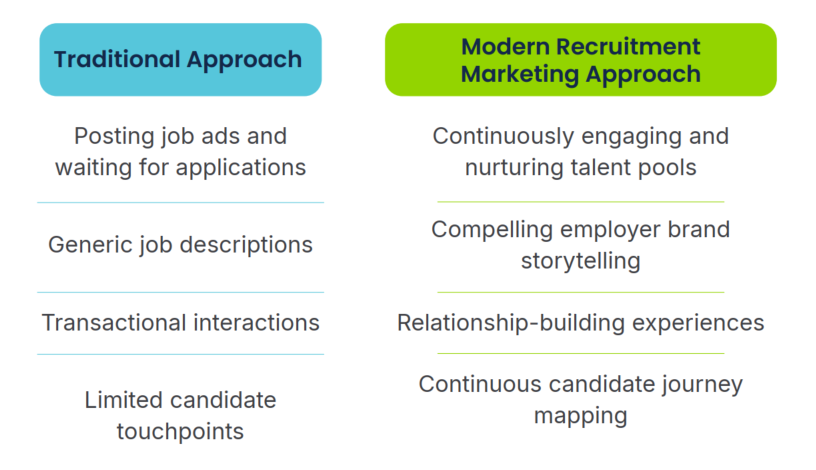Organizations worldwide are discovering that successful talent acquisition requires the same strategic thinking, creativity and relationship-building that drives effective marketing campaigns. Welcome to the world of recruitment marketing—a transformative approach that’s reshaping how companies attract, engage and hire talent.
What is Recruitment Marketing?
So, what is recruitment marketing? Recruitment marketing can be defined as the strategic application of marketing principles and technologies to attract, engage and nurture talent before and during the recruitment process. It represents a holistic approach that views potential candidates not just as applicants, but as consumers of employment experiences.
At its core, it involves:
- Promoting an authentic employer value proposition (EVP) and employer brand
- Developing targeted communication strategies
- Utilizing multi-channel talent engagement approaches
- Building long-term relationships with potential candidates
While traditional recruiting focuses primarily on filling immediate vacancies, recruitment marketing is about building long-term relationships with potential candidates and creating a compelling narrative about your organization as an employer of choice.

Understanding the Marketing Funnel in Recruitment
To truly understand recruitment marketing, you must grasp the basis of any marketing program: the funnel. Just as consumers require engagement across multiple touchpoints before deciding on a purchase, job seekers often need multiple interactions with an organization’s employer brand before applying for a role.
Your recruitment campaigns must coincide with these touchpoints throughout the recruitment funnel. The stages of your talent acquisition funnel depend on your organization’s hiring practices, but typically include:
- Awareness – Introducing potential candidates to your employer brand
- Consideration – Encouraging deeper engagement with your content and values
- Interest – Generating curiosity about your company culture and opportunities
- Application – Converting interested candidates into active applicants
- Selection – Interviewing candidates and choosing the best one for the role
- Hiring – Successfully onboarding selected candidates
During each stage, your recruitment marketing efforts must engage and nurture job seekers, enticing them to take the desired actions to move further down in the funnel.
Why It Matters
Recruitment marketing has emerged as the bridge between traditional human resources practices and modern marketing strategies, enabling companies to stand out in an increasingly competitive global talent marketplace. It’s no longer an optional strategy—it’s a critical necessity.
Skilled professionals have more choices than ever before, so companies must proactively market themselves as employers of choice. This goes beyond competitive salaries and benefits; it’s about creating a compelling narrative that resonates with potential candidates across diverse cultural and professional backgrounds.
Key drivers of recruitment marketing’s importance include:
- Increasing talent scarcity in specialized fields
- Growing expectations of transparency and authenticity from potential employees
- The rise of employer review platforms and social media
- Globalization of talent pools
- Rapid technological transformation of work
Employer Branding: The Foundation of Recruitment Marketing
Employer branding is the foundation of effective recruitment marketing. It represents an organization’s reputation as an employer, encompassing its values, culture and unique workplace proposition.
Key Components of a Strong Employer Brand:
- Clear and compelling Employee Value Proposition (EVP)
- Authentic representation of company culture
- Consistent messaging across all candidate touchpoints
- Demonstration of organizational values and purpose
Cultural Nuances in Employer Branding
What makes an employer brand truly powerful is its ability to transcend geographical boundaries while remaining locally relevant. In an interconnected world, organizations must develop employer brands that are simultaneously global in reach and nuanced in local understanding.
Successful global employer branding requires a delicate balance:
- Maintaining a consistent core brand identity and story
- Adapting messaging to local cultural contexts
- Incorporating local employee perspectives
- Respecting regional diversity while preserving organizational unity
Different cultures interpret workplace values and communication styles uniquely. What motivates talent in Silicon Valley might differ dramatically from motivations in Shanghai or São Paulo. Effective recruitment marketing requires deep cultural intelligence and localized strategy development.
Key considerations include:
- Communication styles
- Work-life balance expectations
- Professional hierarchy perceptions
- Motivation and reward interpretations
The Future of Recruitment Marketing
Recruitment marketing has evolved into a sophisticated, multi-faceted discipline. Organizations that embrace this strategic approach to talent attraction are building sustainable advantages in the competition for talent. By treating potential employees as valued customers and crafting experiences that reflect their genuine employer brand, organizations can build talent pipelines that fuel long-term growth and innovation.


